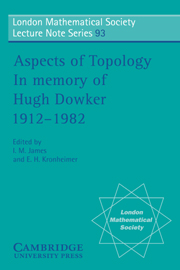Book contents
- Frontmatter
- Contents
- CONTRIBUTORS
- NOTES
- Obituary: Clifford Hugh Dowker
- Knot tabulations and related topics
- How general is a generalized space?
- A survey of metrization theory
- Some thoughts on lattice valued functions and relations
- General topology over a base
- K-Dowker spaces
- Graduation and dimension in locales
- A geometrical approach to degree theory and the Leray-Schauder index
- On dimension theory
- An equivariant theory of retracts
- P-embedding, LCn spaces and the homotopy extension property
- Special group automorphisms and special self-homotopy equivalences
- Rational homotopy and torus actions
- Remarks on stars and independent sets
- Compact and compact Hausdorff
- T1 - and T2 axioms for frames
Special group automorphisms and special self-homotopy equivalences
Published online by Cambridge University Press: 05 May 2013
- Frontmatter
- Contents
- CONTRIBUTORS
- NOTES
- Obituary: Clifford Hugh Dowker
- Knot tabulations and related topics
- How general is a generalized space?
- A survey of metrization theory
- Some thoughts on lattice valued functions and relations
- General topology over a base
- K-Dowker spaces
- Graduation and dimension in locales
- A geometrical approach to degree theory and the Leray-Schauder index
- On dimension theory
- An equivariant theory of retracts
- P-embedding, LCn spaces and the homotopy extension property
- Special group automorphisms and special self-homotopy equivalences
- Rational homotopy and torus actions
- Remarks on stars and independent sets
- Compact and compact Hausdorff
- T1 - and T2 axioms for frames
Summary
Introduction
In 1951 Serre published his famous paper [1] on the homology of fibre spaces, in which he applied Leray's theory of spectral sequences to tremendous effect to obtain powerful new results in homotopy theory. It was Hugh Dowker who drew my attention to this work, whose significance he had quickly appreciated. We were both at that time in Manchester and I learned a great deal from Hugh. Of his own original work, I recall most vividly his example of the topological product of two CW-complexes which failed to have the CW-topology; his beautiful proof of the equivalence of Čech and Vietoris cohomology in his study of the homology groups of relations; and his example of a pathological space whose dimension decreased when a point was judiciously added. I recall, too, that it was Dowker who first noticed Postnikov's work on the analysis of homotopy types and suggested to me that I translate it into English.
In this survey, we look at self-maps of fibre spaces of a special kind and the associated algebraic theory. What we are concerned with is the elucidation of a particular property of finitely generated abelian groups - and hence of simply-connected spaces of finite type - and a generalization to arbitrary abelian groups. This study was initiated by J. M. Cohen [2,3] in 1968, but his definitionscontained an omission which invalidated his results; however, it is a pleasure to acknowledge the originality of his idea.
- Type
- Chapter
- Information
- Aspects of TopologyIn Memory of Hugh Dowker 1912–1982, pp. 281 - 292Publisher: Cambridge University PressPrint publication year: 1985



